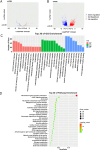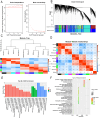A bioinformatics analysis of the target role of miRNA-431-5p on KLK6 in colorectal cancer
- PMID: 40156045
- PMCID: PMC11951700
- DOI: 10.1186/s41065-025-00395-7
A bioinformatics analysis of the target role of miRNA-431-5p on KLK6 in colorectal cancer
Abstract
Background: Although increasing evidence suggests that microRNAs (miRNAs) play different roles in the occurrence, development, and prognosis of colorectal cancer (CRC), investigations on miRNA-targeted regulation in CRC are sparse. However, the high morbidity and mortality of CRC necessitates exploring this area of research for potential alternative therapeutic approaches to CRC.
Methods: Bioinformatics analysis was used to obtain the key Hub genes related to CRC, and survival analysis was performed to screen out the core genes. Meanwhile, verification was performed using CCK-8, Transwell, qPCR, WB, immunohistochemistry and dual luciferase assays at a cellular level.
Results: This study identified the hub gene KLK6 associated with CRC based on the GEO and TCGA databases. Survival analysis revealed a significant decrease in the survival rate of CRC patients with increasing expression levels of KLK6. Target gene prediction confirmed that miR-431-5p can target KLK6. Cell experimental results demonstrated that the miR-431-5p inhibitor enhanced cell viability and promoted cell migration and invasion while miR-431-5p mimics reduced cell viability and inhibited cell migration and invasion. Both the inhibitor and mimics of miR-431-5p suppressed and promoted the expression of miR-431-5p, as well as promoted and inhibited the KLK6 mRNA and protein expression. Dual luciferase results showed that miR-431-5p targeted KLK6, and cell recovery experiments further verified that miR-431-5p regulated cell viability, migration and invasion by targeting KLK6.
Conclusions: Through target gene prediction, miR-431-5p was found to target KLK6, suggesting its therapeutic potential in CRC. As such, therapies that can inhibit KLK6 via miR-431-5p offer a promising approach to CRC.
Clinical trial number: Not applicable.
Keywords: Bioinformatics; Colorectal cancer; KLK6; WGCNA; miR-431-5p.
© 2025. The Author(s).
Conflict of interest statement
Declarations. Ethics approval and consent to participate: The study was approved by the local ethics committee of the Chongqing Traditional Chinese Medicine Hospital. All experiments were performed in accordance with relevant guidelines and regulations such as the Declaration of Helsinki and the patients signed the informed consent form and agreed to be published. Consent for publication: Not applicable. Competing interests: The authors declare no competing interests.
Figures








References
-
- Sung H, Ferlay J, Siegel RL, Laversanne M, Soerjomataram I, Jemal A, et al. Global Cancer statistics 2020: GLOBOCAN estimates of incidence and mortality worldwide for 36 cancers in 185 countries. CA Cancer J Clin. 2021;71(3):209–49. 10.3322/caac.21660 - PubMed
-
- International Agency for Research on Cancer. CANCER TODAY GLOBOCAN 2022 CHINA [Internet]. Lyon, France: International Agency for Research on Cancer. [cited 2025 Jan 15]. Available from: https://gco.iarc.who.int/media/globocan/factsheets/populations/160-china...
-
- Ferlay J, Colombet M, Soerjomataram I, Parkin DM, Piñeros M, Znaor A, et al. Cancer statistics for the year 2020: an overview. Int J Cancer. 2021. 10.1002/ijc.33588 - PubMed
MeSH terms
Substances
LinkOut - more resources
Full Text Sources
Medical
Research Materials

